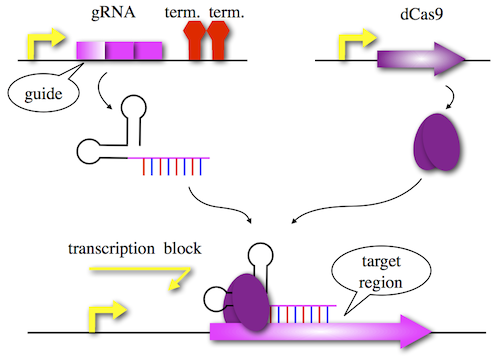Team:Chiba/Parts
From 2013.igem.org
| Line 45: | Line 45: | ||
<h2 style="background-color:#ff9933">CRISPRi</h2> | <h2 style="background-color:#ff9933">CRISPRi</h2> | ||
<h3 style="background-color:#ffdead ">1.Introduction</h3> | <h3 style="background-color:#ffdead ">1.Introduction</h3> | ||
| - | <p> | + | <p>Recently, Qi and colleagues could show that a nuclease inactive mutant of Cas9 (dCas9) in combination with a sequence specific sgRNA can be utilized for targeted DNA recognition to interfere with transcriptional elongation, RNA polymerase or transcription factor binding (Fig. 1). With unique sgRNA specific for target region, you can knockdown target gene conditionally without any genome modification. This gene silencing activity was termed <strong>CRISPRi</strong> for CRISPR(clustered regularly interspaced short palindromic repeats) interference in reference to RNAi [引用].</p> |
| - | |||
| - | |||
| - | |||
| - | |||
| - | |||
<br> | <br> | ||
Revision as of 22:47, 27 September 2013

Parts
Ferritin
1. Introduction
CRISPRi
1.Introduction
Recently, Qi and colleagues could show that a nuclease inactive mutant of Cas9 (dCas9) in combination with a sequence specific sgRNA can be utilized for targeted DNA recognition to interfere with transcriptional elongation, RNA polymerase or transcription factor binding (Fig. 1). With unique sgRNA specific for target region, you can knockdown target gene conditionally without any genome modification. This gene silencing activity was termed CRISPRi for CRISPR(clustered regularly interspaced short palindromic repeats) interference in reference to RNAi [引用].

Improvement Parts : expression vector with pBAD/Ara switch compatible for "Golden gate gene swapping"
1. Introduction
Gentic switch such as pBAD/araC system is very useful for overexpression of given genes. In order to place the various open reading frames with its RBS under the pBAD/araC system, we improved BBa_I74608 to insert BsaI site in both sides of sfgfp gene. This improvement enables us to use ‘Golden Gate’ cloning Method as described below (Fig. 2):
1) Preparation of insert fragment : Given gene(s) are PCR amplified with the additional sequence coding for ribosome-binding sites and BsaI site.
2) BBa_I74608 and PCR amplified insert fragment is BsaI digested and ligated in a single-pot reaction.
This method is designed BsaI site doesn't remain on the vector after digesting BsaI. So, you can perform digestion and ligation at the same time. You can obtain desired plasmids in a short time.

Fig. 1 Golden Gate cloning strategy
2. Material & Method
We performed Golden Gate cloning with this part (vector) and mRFP (insert) and checked function. And we investigated the reaction rate changing mol ratio of vector to insert. The protocol is below.
1) PCR up insert with BsaI site
2) Golden Gate cloning
3) transformation
Mixture list in Golden Gate is below.
3. Result
Table 1 cfu/transformation

Table 2 Reaction ratio


Fig. 2 Reaction ratio (N.D.: Not Detected)

Fig. 3 Plate
In the traditional ligation, the best ratio is vecor: insert= 1: 3. However, according to this experiment, the best ratio was vector: insert= 1: 1in the Golden Gate. The vector ............................... vectorが切られたあと再びsfGFPとligateする可能性もあり,これがまた切られるためにBsaIが使用される。したがって,insertが多いとvectorとBsaIの衝突頻度が低下するため,liationが進みにくいと考えられる。
The maximum reaction rate was 68.9%. There existed few back ligations. Therefore, selecting colonies not shining green, you can pick the desired colonies easily.
 "
"